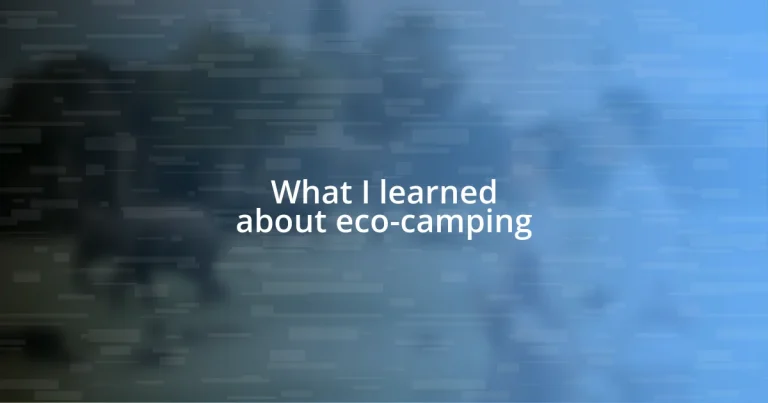Key takeaways:
- Eco-camping emphasizes sustainability by practicing resource conservation, community engagement, and leaving natural spaces cleaner than found.
- The benefits of eco-camping include a deep connection with nature, improved mental well-being from unplugging, and active participation in environmental conservation.
- Essential gear and responsible behaviors, such as using biodegradable products and respecting wildlife, are crucial for minimizing environmental impact while camping.
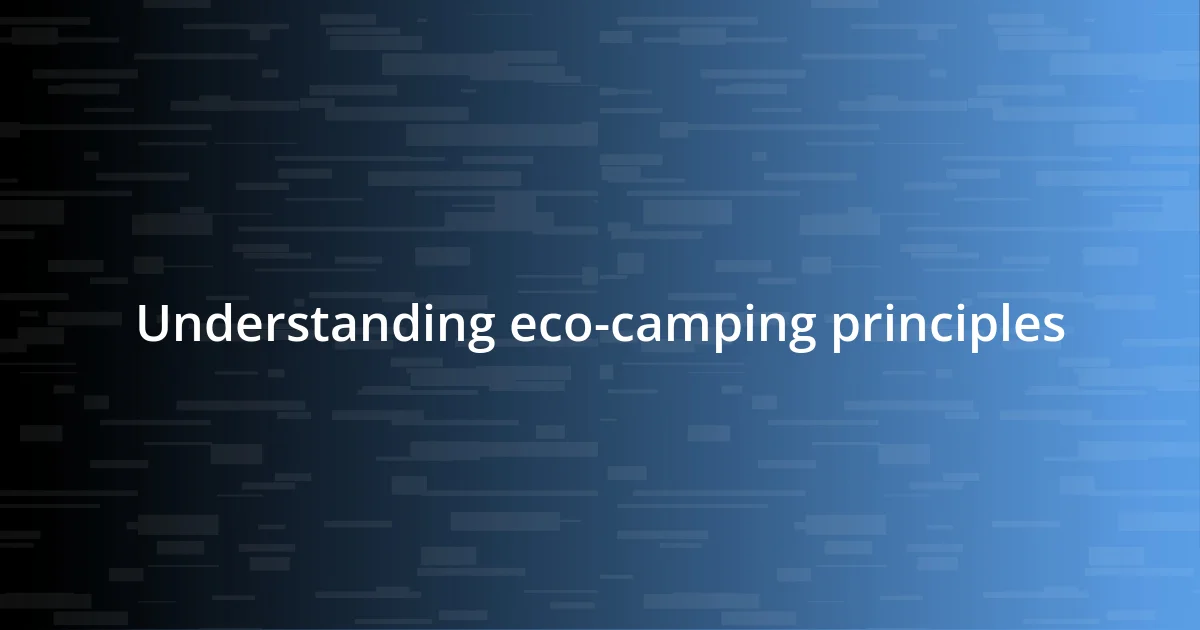
Understanding eco-camping principles
Eco-camping is grounded in principles of sustainability and respect for nature. I remember my first experience camping in this way, where we left the campsite cleaner than we found it. It struck me how even small actions, like packing out trash or using biodegradable soap, can make a significant impact. Have you ever considered how your camping habits might affect the environment?
Another core principle of eco-camping is resource conservation. I once learned this the hard way when I left the shower running while brushing my teeth, wasting precious water. Since then, I’ve become much more mindful of my water and energy usage, realizing that even the simplest changes can contribute to a larger goal. By embracing these principles, we not only enhance our camping experience but also contribute to the preservation of the beautiful landscapes we enjoy.
Finally, a sense of community plays a vital role in eco-camping. On one trip, I connected with fellow campers over shared meal prep, using locally sourced ingredients. This practice not only reduces our carbon footprint but also fosters a deeper appreciation for the environment. Isn’t it incredible how eco-camping can create bonds that last long after we leave the campsite?
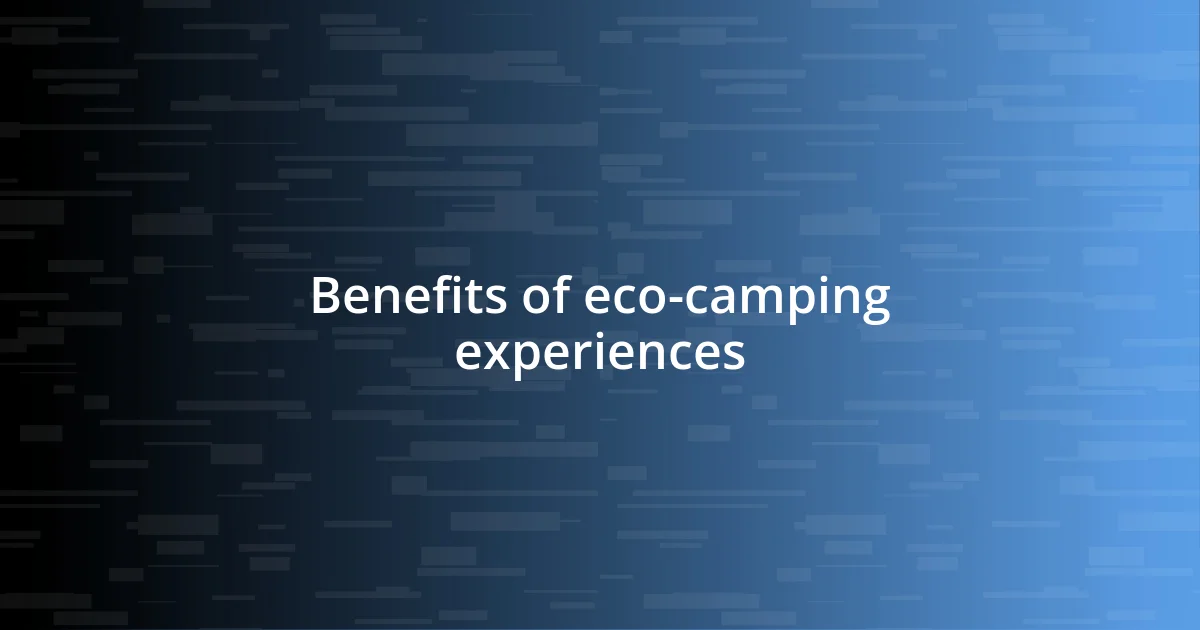
Benefits of eco-camping experiences
Eco-camping offers a myriad of benefits that extend beyond simply enjoying the great outdoors. One of the most striking advantages I’ve found is the profound connection with nature that it fosters. I remember sitting by the campfire, gazing at the stars, and feeling an overwhelming sense of peace. It’s as if the worries of daily life fade away, and you truly become part of the ecosystem surrounding you. Has that sense of tranquility ever washed over you in nature?
Another significant benefit combines personal well-being with environmental consciousness. During a recent trip, I noticed how unplugging from technology not only helped me recharge mentally but also encouraged me to appreciate the subtle beauty around me—the rustle of leaves, the chirping of crickets. Eco-camping challenges us to slow down and immerse ourselves in the present moment, enhancing both our mental health and our environmental awareness. Isn’t it remarkable how a break from routine can shift our perspective?
Furthermore, eco-camping is an opportunity to give back to the environment. On one memorable outing, my group participated in a local cleanup. Gathering litter from hidden trails not only boosted our spirits but also instilled a sense of responsibility for preserving these beautiful places for future generations. I believe this kind of participation can transform how we see our environment and foster a lifelong commitment to sustainability.
| Benefit | Description |
|---|---|
| Connection with Nature | Enhances feelings of peace and belonging. |
| Improved Mental Well-Being | Encourages unplugging from technology and mindfulness. |
| Environmental Responsibility | Fosters active participation in conservation efforts. |
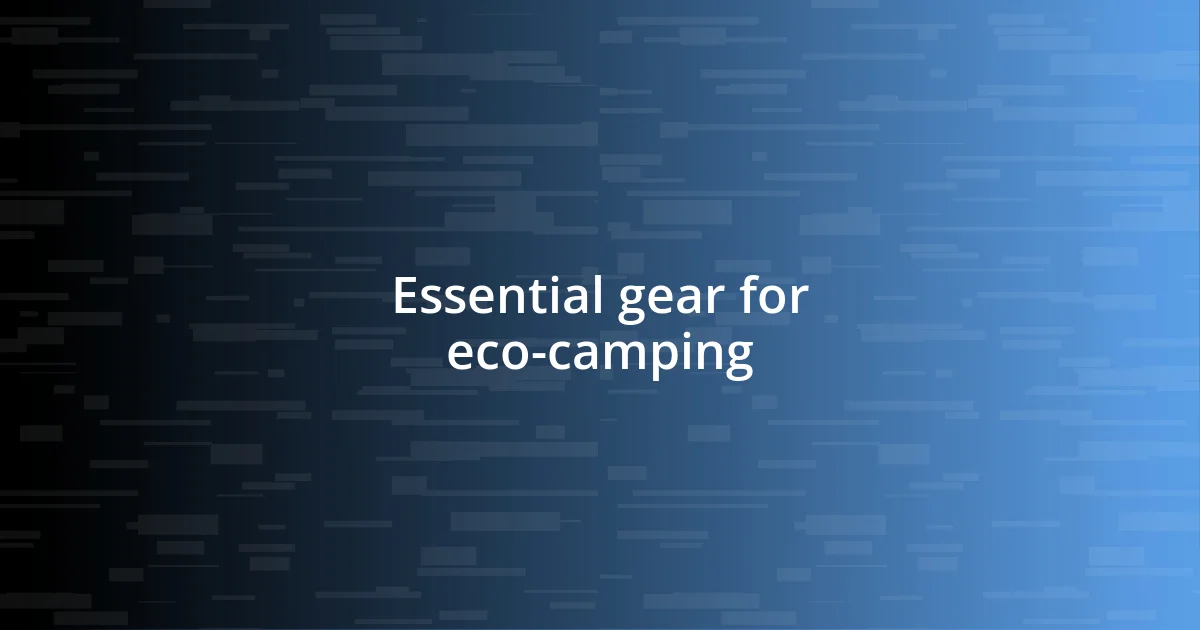
Essential gear for eco-camping
When preparing for eco-camping, having the right gear is essential to ensure both comfort and sustainability. I’ve learned that choosing multi-functional equipment not only saves space but also reduces the need for excessive items. For instance, I once packed a solar-powered lantern that doubled as a power bank for my devices. This single item not only illuminated my campsite but also allowed me to keep my essential gadgets charged without relying on non-renewable energy.
Essential gear for eco-camping includes:
- Biodegradable soap: Great for washing dishes without harming the environment.
- Reusable food containers: Helps reduce plastic waste while keeping food fresh.
- Solar-powered equipment: Provides energy without depleting natural resources.
- Eco-friendly clothing: Materials made from recycled or sustainable fabrics enhance comfort and reduce environmental impact.
- Trekking poles: Useful for navigating trails while minimizing damage to the ecosystem.
Another crucial aspect is that the choice of materials can significantly affect our camping footprint. I once made the mistake of bringing along a cheap, plastic sleeping pad that ended up in the trash after a few uses. It hit me then how my choices could influence the environment, and I decided to invest in a high-quality, durable sleeping mat made from sustainable materials. This experience also taught me the value of investing in gear that lasts, rather than succumbing to impulse buys.
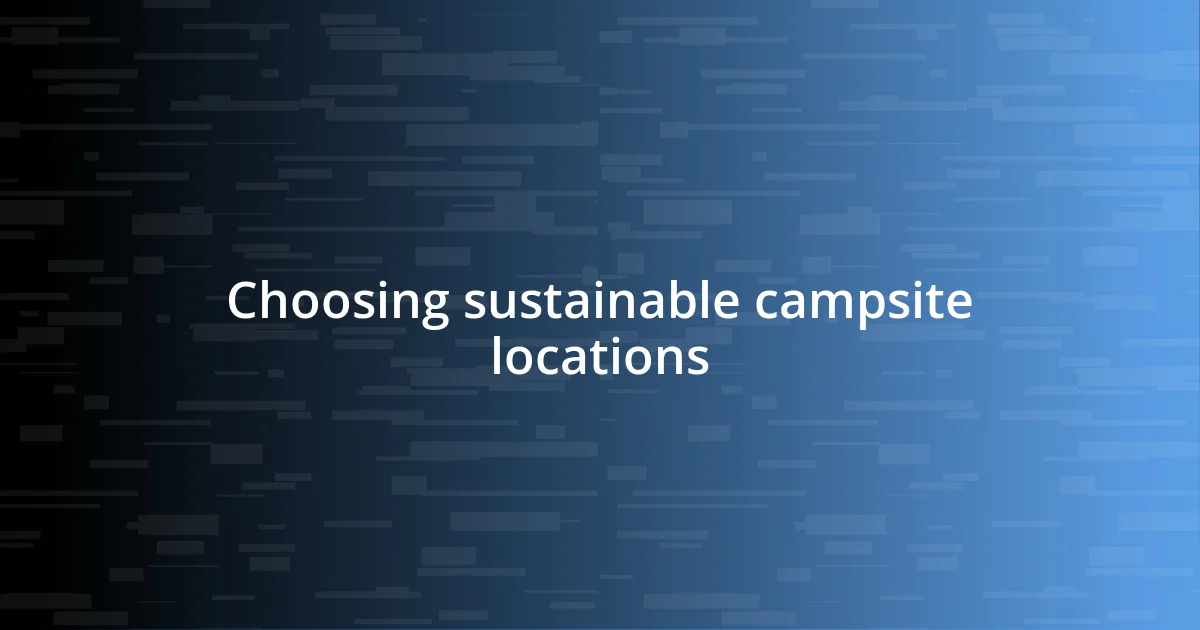
Choosing sustainable campsite locations
When it comes to choosing sustainable campsite locations, I always consider the impact on the surrounding ecosystem. On my last trip, I stumbled upon a secluded site that was already being used by others but left untouched by litter. I felt an instant connection to this place, realizing that selecting campsites like this helps reduce wear on more vulnerable areas. Have you ever noticed how certain spots can feel sacred because of their untouched nature?
I also pay attention to local regulations and guidelines when selecting a campsite. There was one camping experience I had where I initially picked a spot too close to a water source. The ranger informed me about the potential harm that could come from runoff and wildlife disturbance. It was a wake-up call, reminding me that being mindful of our choices is essential for maintaining biodiversity. What I’ve learned is that respecting these guidelines not only protects nature but enhances our experiences, allowing us to witness the beauty of an undisturbed environment.
Lastly, examining the accessibility of a potential campsite is crucial. While it might be tempting to find that hidden gem far off the beaten path, I’ve realized that accessibility for both myself and fellow campers can contribute to sustainability. On one occasion, I opted for a more accessible campsite that encouraged inclusivity, allowing not just seasoned hikers but families with kids to enjoy the outdoors. Isn’t it fantastic when nature becomes a shared experience for everyone? Choosing spots with thoughtful access can truly foster a sense of community in the great outdoors.
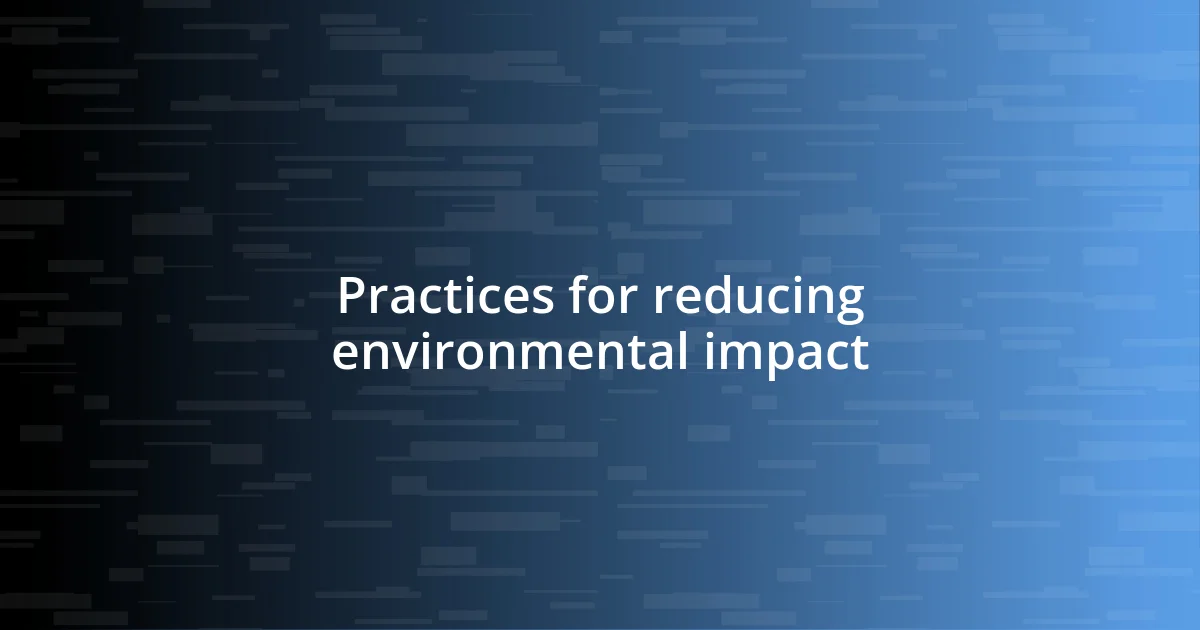
Practices for reducing environmental impact
One of the simplest yet most impactful practices I’ve embraced is minimizing my waste during camping trips. I remember a particular outing where I tried a new approach: bringing only reusable utensils and cups. The result? Not a single piece of trash was generated, and it felt incredibly rewarding to know that I wasn’t contributing to the pollution of the beautiful natural spaces I love. Have you ever experienced the satisfaction of leaving no trace behind?
I also make a deliberate effort to follow the “Leave No Trace” principles, which guide me to respect the landscapes I explore. On one occasion, I found myself at a pristine lake where the beauty was almost overwhelming. I realized how important it was to pack out everything I brought in, including organic waste. By doing this, I not only preserved the environment but also felt a deeper connection to the wilderness. Isn’t it astonishing how small actions can protect such beautiful places?
Collecting and using rainwater is another practice I’ve adopted that has transformed my camping experience. I’ll never forget the time I set up a simple rain collection system during a drizzly trip; the satisfaction of gathering water for my meals and personal use felt like a small victory. Using natural resources mindfully not only minimizes my impact but also amplifies my appreciation for nature. Have you thought about how tapping into nature’s gifts can lead to a more sustainable adventure?
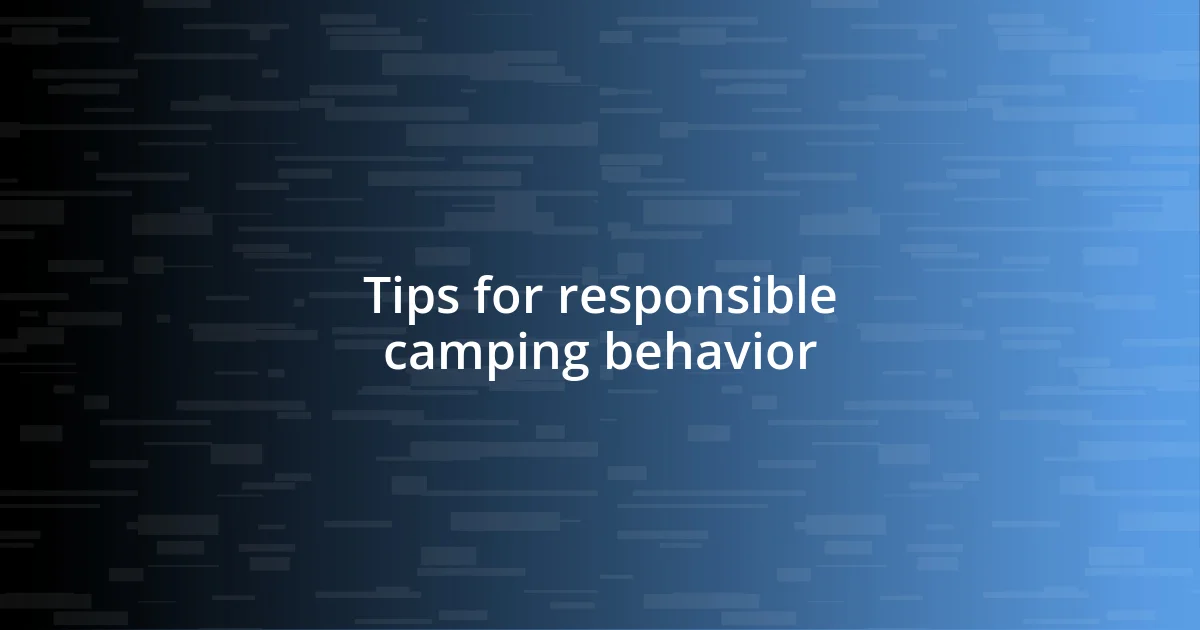
Tips for responsible camping behavior
When it comes to responsible camping behavior, I always pack out everything I bring in—no exceptions. On one trip, I saw a family struggling with bags of rubbish scattered near their campsite, and it really hit me how vital our role is in caring for these spaces. Have you ever left a campsite and felt that pang of guilt for not doing your part? I decided then that I would actively ensure that everything I used would return with me.
Additionally, respecting local wildlife is something that I keep front of mind during my outdoor adventures. Once, while enjoying my morning coffee, a curious raccoon wandered close to camp. Instead of feeding it scraps, I felt it was important to remind myself (and others) that a well-fed wild animal may lose its natural instincts—compromising its safety and ours. Trust me, it’s far more rewarding to watch wildlife thrive in their natural habitat rather than disrupt their lives for a moment’s delight.
Another tip that I swear by is choosing eco-friendly gear. I remember swapping out my old camping stove for a solar-powered one, amazed at how much lighter and easier my pack felt. Plus, using renewable energy resources helps me tread lightly on the Earth. Isn’t it empowering to know that our gear choices can contribute to a healthier planet? A small shift in the equipment we use can lead to significant positive impacts on the environment we cherish so much.
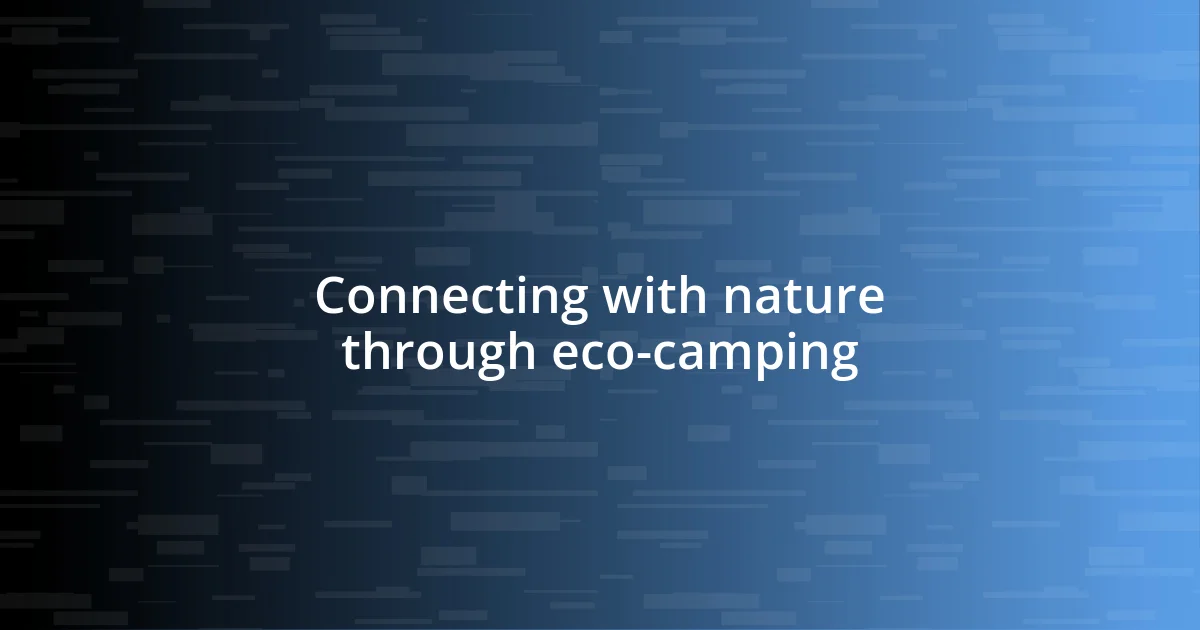
Connecting with nature through eco-camping
Connecting with nature through eco-camping is an experience that truly deepens my appreciation of the environment. I vividly remember sitting quietly in my tent one evening, listening to the gentle rustling of leaves and the distant sound of a river flowing by. I felt a profound connection to the world around me, realizing that by immersing myself in nature, I was also embracing a pure, unfiltered existence. Have you ever felt that deep sense of belonging when surrounded by natural beauty?
One of the most rewarding aspects of eco-camping is the opportunity to engage with the land sustainably. I once participated in a local restoration project where we helped cultivate native plants in a nearby area. Witnessing the transformation of that barren patch of soil into a thriving garden was exhilarating! It reminded me how interconnected we are with our surroundings and how my actions can help nurture the very ecosystems that bring me so much joy. Isn’t it amazing to think that our hands can play a part in healing the environment?
Through eco-camping, I’ve not only found peace but also learned to tune into nature’s rhythms. During a recent trip, I spent the early morning watching the sunrise while sipping herbal tea, captivated by the soft glow illuminating the landscape. This simple ritual allowed me to pause and reflect on my journey, recognizing how these moments of connection not only enrich my spirit but also inspire a sense of responsibility to protect the earth we share. Have you taken the time to notice the little wonders around you while camping?












